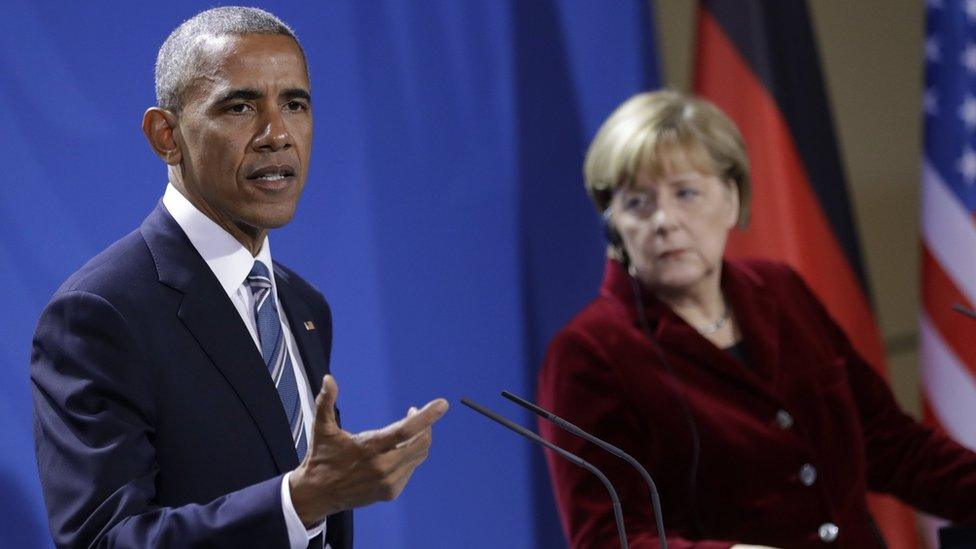Why Germany is sorry to see Obama go
- Published

Barack Obama and Angela Merkel have collaborated on many issues
When Barack Obama came to Berlin in 2008 he was greeted like a rock star.
Hundreds of thousands of cheering Germans turned out for the then presidential candidate and roared their approval of his vision of a new America - one which would be open to, and co-operate with, the rest of the world. His liberal and diplomatic tone struck a chord with many in the excited crowd.
Few here are cheering now.
What should have been Barack Obama's farewell visit to Berlin has been overshadowed by the man who will follow him into the White House.
The election of Donald Trump has profoundly shocked this country. Even as Berlin frantically hurries to establish diplomatic ties with Mr Trump's team, there is resignation. It will be some time before anyone really knows where the president-elect really stands on international relations.
There is also concern. A recent poll by the national broadcaster revealed the majority of Germans believe their country's relationship with the US will suffer.
For some years now, it has been a pretty special relationship.
Trading partners
Air Force One touched down in winter drizzle on Wednesday night just in time for Barack Obama's first engagement - a three-hour long dinner, which reportedly included a currywurst course, with the woman he calls his closest international ally.
The two leaders have built a strong and warm partnership that survived the revelation that US spies had listened into Angela Merkel's mobile phone calls.
They have worked closely together on issues like trade - America is Germany's largest trading partner - and both leaders have tried, and struggled, to see through the controversial free trade agreement (TTIP) between America and Europe.
They have also co-operated on climate policy and the conflict in Ukraine. Mrs Merkel has wielded significant global influence as mediator between Russia and the West.
Many Germans fear relations with the US will suffer under Donald Trump
No wonder, perhaps, she and Mr Obama have used this, his final visit, to stress their continued commitment to such issues, as well as promising that their countries will continue to work together. Neither wants their work, their vision - or in Mr Obama's case, legacy - destroyed.
Speaking alongside Mr Obama at a news conference in Berlin on Thursday, Mrs Merkel said Germany would continue to pursue free trade deals with the US.
She said she hoped to "work closely with the new president".
Both leaders have also pledged to continue to uphold the values of freedom, justice and democracy.
But - as one minister here recently put it - the world is entering a period of vacuum which will be defined by questions to which no-one knows the answer.
Donald Trump has indicated his disdain for climate change policy and free trade. The tide of populism that swept him to victory is washing over Europe, too.
Mrs Merkel must confront Germany's own anti-migrant, anti-Muslim Alternative for Germany party (AfD) which is snapping at the ankles of Germany's establishment parties and likely to win seats in the national parliament next year.
So what is, in effect, a message to Mr Trump and an attempt to reassure those unnerved by his victory may, in reality, be a largely symbolic statement.
In these uncertain times, one fact remains. Angela Merkel - Germany - will miss Barack Obama.